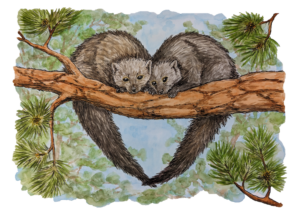The Pacific Fisher
The Pacific fisher (Pekania pennanti) of the Southern Sierra Nevada was listed as federally endangered in June 2020. The fisher population within Sequoia National Park is of particular interest to scientists.
Current efforts to learn more about this elusive forest-dwelling carnivore include monitoring, setting remote cameras in areas of mixed or low severity fire within the KNP fire footprint to see if fishers are still present in what was previously optimal habitat and also individual fishers using small GPS collars to learn about how their movements as they explore a landscape altered by fire. Specifically, they hope to better understand the characteristics of the areas where they are entering the fire footprint (e.g., patches of older forest that may have burned at low intensity) and whether they are moving through or around patches of forest that burned at higher intensity.
Giant Conversations: The Pacific Fisher
We hope that you take a moment to watch our Giant Conversation featuring the Pacific fisher and walk away with a greater understating of what precisely a Pacific fisher is, where they live, how the recent wildfires have impacted their habitat, and ways that the National Park Service and Sequoia Parks Conservancy are working together to give this federally endangered species hope for the future.
Our mission at Sequoia Parks Conservancy is simple: protect, preserve, and provide access to Sequoia and Kings Canyon National Parks. Our mission grounds us and gives us a pathway to deliver enriching and fulfilling visitor experiences, establish a continuous and growing funding stream, provide enhanced educational experiences, and engage Sequoia and Kings Canyon National Parks advocates.
To help ensure crucial work with the Pacific fisher continues, please consider donating to our Pacific Fisher Fund. Funds raised for the Pacific fisher will pay for collars, cameras, and technicians in an effort to understand how the KNP Complex Fire and climate change have affected their habitat.


